Americans might complain about the high cost of living, but overseas the U.S. dollar is even weaker. Find out where it buys the least.
Australia, former penal colony, home to the Great Barrier Reef, and producer of world-class shiraz, has never exactly been synonymous with a high cost of living. Yet because of a strong economy and proximity to the booming Asia Pacific region, many overseas visitors might find it more expensive to slip an extra shrimp -- or just about anything else for that matter -- on the barbie here than in most other countries around the world. In fact, in a recent survey, six Australian cities placed among the top 30 most expensive in the world, according to global human resources firm ECA International. Just two years ago, not a single Australian city ranked in the top 100.
Australia is not alone in becoming more expensive. Singapore, for example, rose to No. 36 in ECA's ranking, from No. 68 last year, on the strength of the Singapore dollar. Caracas, Venezuela, rose from No. 91 to No. 15, a result of rampant inflation.
The city that earns the dubious honor of being the most expensive for holders of U.S. dollars is Tokyo, a rank it also enjoyed last year. How expensive is it? How about $24 for a movie ticket and nearly $11 for a beer. Japan dominated the ranking with four of the 10 most expensive -- in addition to Tokyo, Nagoya (No. 3), Yokohama (No. 5), and Kobe (No. 9) also made the list.
Due to the weakened U.S. dollar, no U.S. city ranked in the top 30 this year. The country's most expensive city, Manhattan, N.Y., fell to No. 44, from No. 28 in 2010, making it cheaper than Canada's Toronto (No. 37) and Vancouver (No. 42). The U.S.'s second most expensive city, Honolulu, fell to No. 62 from No. 40. (And while they haven't yet, it could be only a matter of time before Beijing (No. 46) and Shanghai (No. 47) crack the top 30.)
Of course, a weak dollar is not necessarily a bad thing. "If the U.S. continues to be relatively cost-effective in an international context, we will see companies pay more attention to whether they are saving money by expanding operations in places like Asia if the cost of living in these places is increasing," says Lee Quane, ECA International's regional director for Asia.
Aussie Dollar Strengthens
ECA International's ranking is based on a survey carried out in more than 400 cities worldwide in March. It compares the costs of living for expatriates maintaining a standard of living on a par with developed countries to guide employers' salary and benefits offers. Items such as food and beverage, basic goods and services, and some entertainment are included, but the survey excludes housing, utilities, car purchases, and school fees, which can vary widely and typically are counted separately in expatriate compensation packages.
A combination of inflation, availability of goods, and exchange rates affect costs. "The strong Australian dollar, which hit parity with the U.S. dollar last November and has strengthened further since, has been a significant factor behind the continued rise of Australian locations up the global ranking," Anna Michielsen, general manager for Australia, New Zealand, and the Pacific for ECA International, said in a release.
The Australian dollar has strengthened by nearly 30 percent against the U.S. dollar since last June. That means a $100 meal would have cost about $83 last June and now costs about $106. The country is also becoming more expensive than other locations in Asia: ECA points out that goods and services in Sydney were only 3 percent more expensive than in Hong Kong last year and are now 17 percent more costly.
Rising prices, particularly of food and energy, also play a role: Fruit prices in Australia were up 24.9 percent year-on-year in the first quarter and vegetable prices 18.7 percent (due in part to floods); electricity rose 11.7 percent and gasoline 9.3 percent, according to the Australian Bureau of Statistics. Overall consumer prices in the quarter were 3.3 percent above their level a year ago. The bureau forecast in January that weekly living costs for families could increase by as much as A$100 per week this year.
Deteriorating Competitiveness
The cost of a quick lunch in a Sydney restaurant is now $27.10, compared with $20.57 in Manhattan; a dozen eggs is $5.60, against $3.65 in Manhattan; and a tube of toothpaste is $5 vs. $3.72 in Manhattan, according to ECA International.
Since 2004, Australia has seen a deterioration in its relative competitiveness doing business globally, says Glenn Mair, director of MMK Consulting in Vancouver and a leader of KPMG's Competitive Alternatives study, which analyzes the costs of doing business in cities around the world.
In 2004, the cost of doing business in Australia was about 8.5 percent lower than in the U.S., according to KPMG's report. By 2010, the gap had shrunk to 2.2 percent, due to Australia's strong dollar and stable economy during the global economic crisis.
"I anticipate some improvement for U.S. [competitiveness] if currency trends stay the same," Mair says. He adds, however, that volatile exchange rates can make this hard to predict.
It is too early for companies to change their strategy based on recent cost changes, and many other considerations are involved, says ECA's Quane. Still, signs are that U.S. cities may be becoming more cost competitive for businesses.
World's Most Expensive Cities 2011
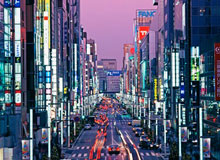 |
No. 1: Tokyo
Quick lunch: $20.80
Beer at a bar: $10.56
Kilogram of rice: $9.80
Dozen eggs: $4.50
Movie theater ticket: $23.80
Although the consumer price index in the Tokyo area has been falling since 2009, according to data from Japan's statistics bureau, the city remains the world's most expensive. While housing costs are not included in this survey, ECA International estimates that the average monthly rent for a two-bedroom apartment in Tokyo stood at $4,352 in September.
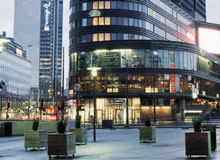 |
No. 2: Oslo
Quick lunch: $45.20
Beer at a bar: $13.18
Kilogram of rice: $6.10
Dozen eggs: $8.50
Movie theater ticket: $18.80
Norway's capital is a major hub for trade, shipping, and finance and is home to the Oslo Stock Exchange. Oslo has ranked among the world's most expensive cities for years, which is not surprising when a quick lunch costs about $45 and a dozen eggs, $8.50.
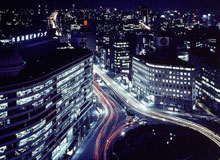 |
No. 3: Nagoya, Japan
Quick lunch: $19
Beer at a bar: $11.37
Kilogram of rice: $8.50
Dozen eggs: $3.60
Movie theater ticket: $21.80
Nagoya is one of Japan's premier industrial and technological centers and is well known for its high quality of life and competitive business costs, according to the U.S. Commercial Service. Unlike Japan's other major cities, Nagoya was not significantly harmed by the global economic downturn and has maintained its growth.
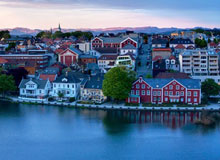 |
No. 4: Stavanger, Norway
Quick lunch: $32.30
Beer at a bar: $12.83
Kilogram of rice: $5.70
Dozen eggs: $6.80
Movie theater ticket: $17.30
Stavanger was mainly a fishing community until oil was found in the North Sea in the 1960s, transforming it into a major Norwegian city. Today, Norway is a leading oil exporter, with Statoil as the largest oil company in the Stavanger region. The industry has become central to the local economy and has attracted many residents from other countries.
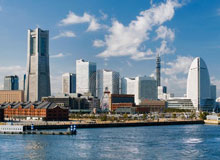 |
No. 5: Yokohama, Japan
Quick lunch: $16.90
Beer at a bar: $6.59
Kilogram of rice: $4.20
Dozen eggs: $2.50
Movie theater ticket: $21.70
Japan's second-largest city after Tokyo, Yokohama is easily reached from Tokyo by train. The port city is home to over 300 IT firms and has a growing biotechnology base, according to the city. Yokohama has nine main business districts and exports many cars and auto parts.
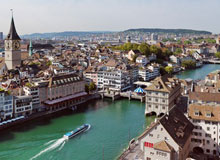 |
No. 6: Zurich
Quick lunch: $32.90
Beer at a bar: $10.54
Kilogram of rice: $3.70
Dozen eggs: $7.90
Movie theater ticket: $19.60
The financial sector is an important part of Zurich's economy and the city is home to the Swiss Stock Exchange and companies such as Credit Suisse and Swiss Re. Zurich is also a major transportation hub. Mercer ranked the city second in the world for quality of life in 2010, but such a high standard of living does not come cheap: Zurich jumped to No. 6, from being the 10th most expensive city last year.
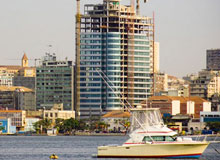 |
No. 7: Luanda, Angola
Quick lunch: $52.40
Beer at a bar: $6.62
Kilogram of rice: $4.60
Dozen eggs: $5.20
Movie theater ticket: $13.90
Luanda was the most expensive city in the world in ECA International's 2009 ranking. Last year it slipped to third place, due to the depreciation of the kwanza, and this year it fell again, to No. 7. While the city has a high poverty rate, it remains one of the most expensive places for expatriates to maintain standards of living comparable to those in their home countries.
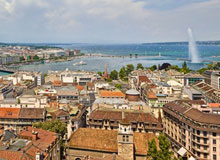 |
No. 8: Geneva
Quick lunch: $33.70
Beer at a bar: $9.12
Kilogram of rice: $4.70
Dozen eggs: $8.60
Movie theater ticket: $19.20
Truly a global city, Geneva is home to such international organizations as the United Nations (which has an office in the city) and the International Committee of the Red Cross. An important center for banking, government, and technology, Geneva attracts many professional visitors, as well as tourists. It ranked as the third-best city in the world for quality of life in Mercer's 2010 report.
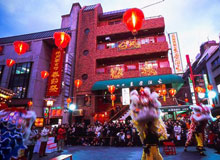 |
No. 9: Kobe, Japan
Quick lunch: $15.60
Beer at a bar: $8.69
Kilogram of rice: $9.30
Dozen eggs: $3.10
Movie theater ticket: $20.80
Kobe is one of Japan's busiest ports and a manufacturing center for appliances, food, and transportation equipment. The city offers many types of cuisine, though it's known best for high grade and pricey Kobe beef.
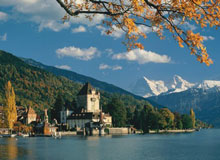 |
No. 10: Bern, Switzerland
Quick lunch: $28.80
Beer at a bar: $7.46
Kilogram of rice: $4.70
Dozen eggs: $8.40
Movie theater ticket: $19.10
Switzerland's capital, Bern is the center of Swiss government, the engineering industry, and the precision industry, as well as a manufacturing center for watches and other technology used in the medical, IT, and automotive sectors, according to the Bern Economic Development Agency. Branded watches such as Rolex, Longines, Swatch, and Rado are manufactured in the Canton of Bern.
No comments:
Post a Comment